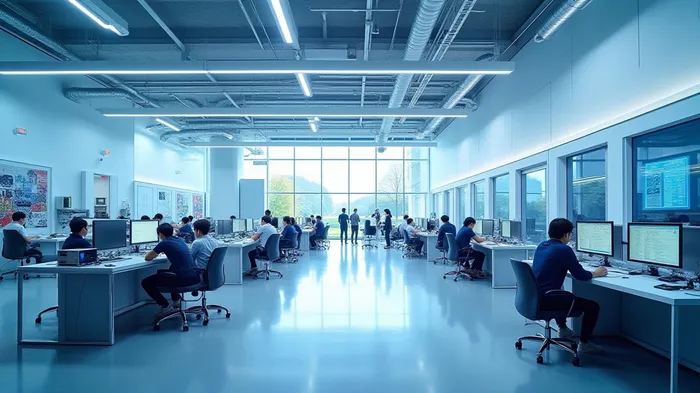TSMC's Munich Gambit: Securing Global Semiconductor Supremacy Amid Geopolitical Crosscurrents
The semiconductor industry, once a quiet engine of global tech progress, has become a battleground for geopolitical influence and technological dominance. Taiwan Semiconductor Manufacturing Company (TSMC) is making its boldest move yet: a new chip design center in Munich, Germany, set to open in Q3 2025. This is not merely an expansion—it is a strategic masterstroke to cement TSMC's position as the linchpin of the global semiconductor ecosystem.
The Geopolitical Calculus of Munich
The Munich facility is the latest front in TSMC's response to a fractured geopolitical landscape. With the U.S.-China trade war intensifying, supply chain vulnerabilities exposed by chip shortages, and Europe's push for tech sovereignty, TSMC is hedging against over-reliance on its Taiwanese base. The Munich center will serve as a hub for European clients designing advanced chips for automotive, AI, and IoT—a sector where demand is exploding. By anchoring design capabilities in Europe, TSMC ensures it can meet regional requirements without compromising on cutting-edge technology.
This move also complements TSMC's joint venture in Dresden, Germany, with Infineon, NXP, and Bosch, which is building a $10 billion manufacturing plant (ESMC). Together, Munich and Dresden form a “design-to-manufacturing” ecosystem, reducing Europe's reliance on Asian and American chip suppliers. For TSMC, this is not charity—it's a strategic play to lock in long-term contracts and counter rivals like Intel and Samsung, which are also scrambling to position themselves in Europe.
Technological Leadership: The 2nm Edge
TSMC's Munich center is not just about geography; it is about maintaining technological supremacy. The facility will focus on designing chips using TSMC's next-generation 2-nanometer (2nm) and 1.6nm process nodes, which offer 20-30% better power efficiency than their predecessors. These advancements are critical for AI data centers, electric vehicles, and smart devices—markets projected to drive a 45% annual growth rate in AI-related chip revenue by 2030.
By embedding its R&D in Munich, TSMC ensures European companies like BMW, Siemens, and NVIDIA (which already relies on TSMC for GPUs) can access these breakthroughs. This proximity to customers accelerates product cycles and deepens partnerships, creating a moat against competitors.
The Case for Regional Diversification
TSMC's expansion into Europe is part of a broader $165 billion global investment strategy. While the U.S. receives the lion's share ($65 billion in Arizona, plus another $100 billion in new facilities), Europe's role is equally vital:
- Mitigating Geopolitical Risk: Decentralizing production reduces exposure to Taiwan's political vulnerabilities, including cross-strait tensions and U.S. export controls.
- Access to Talent and Capital: Munich's tech ecosystem and Germany's engineering prowess provide a talent pool to rival Silicon Valley.
- Trade Policy Compliance: Aligning with the EU's Chips Act and U.S. CHIPS Act ensures TSMC remains eligible for subsidies and avoids trade barriers.
The Investment Thesis: Why TSMC's Move Spells Opportunity
For investors, TSMC's Munich gambit is a signal of confidence in its long-term dominance. Key drivers for growth:
- AI and Automotive Megatrends: The Munich center positions TSMC to capture the $200 billion AI chip market and the $150 billion automotive semiconductor market, both growing at >20% annually.
- Supply Chain Resilience: Diversified manufacturing and design hubs reduce operational risks, making TSMC an indispensable partner.
- Valuation Catalysts: The EU's tech sovereignty push could lead to direct subsidies or exclusive contracts for TSMC's European operations.
Act Now: The Clock is Ticking
TSMC's Munich announcement underscores a simple truth: the semiconductor industry's center of gravity is shifting. Investors who recognize this shift early will profit as TSMC's global footprint and technological edge translate into sustained revenue growth.
The risks? Minimal. TSMC's scale, R&D prowess, and strategic foresight—evident in Munich—make it a rare “defensive growth” stock. With geopolitical and technological tailwinds at its back, TSMC is not just surviving—it is redefining the rules of the game.
The question is no longer whether TSMC will dominate, but how much of this dominance you can capitalize on. The Munich center is the opening move in TSMC's endgame. Get in now, before the rest of the world catches up.
Note: All projections and figures are based on TSMC's public disclosures and industry analyses as of Q2 2025.
Delivering real-time insights and analysis on emerging financial trends and market movements.
Latest Articles
Stay ahead of the market.
Get curated U.S. market news, insights and key dates delivered to your inbox.

Comments
No comments yet